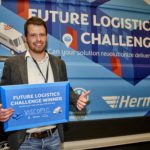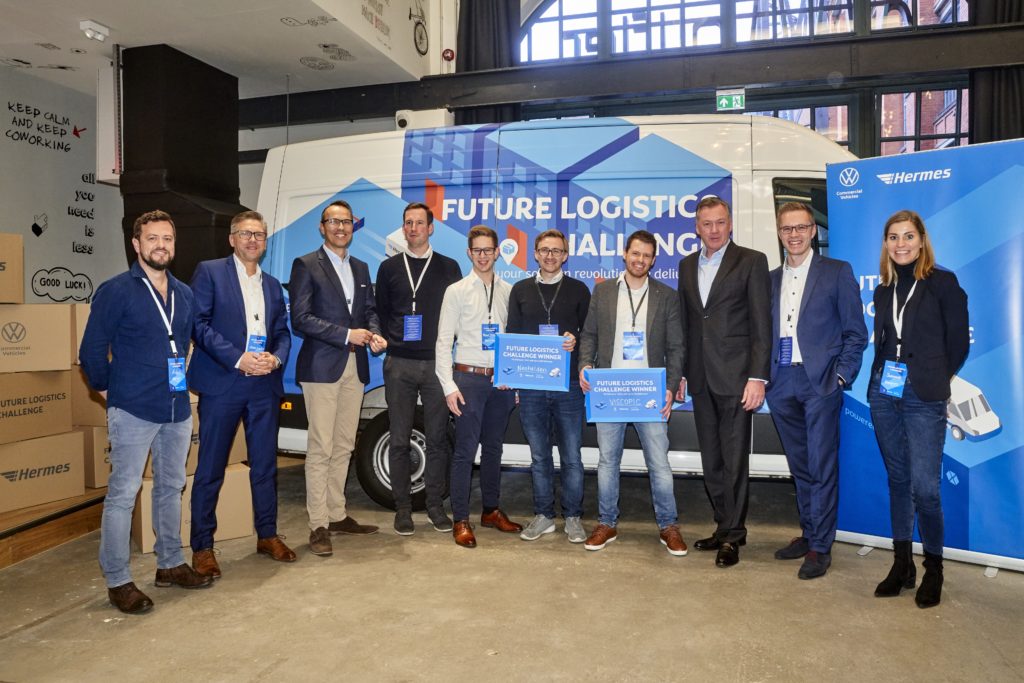Hermes Europe and Volkswagen Commercial Vehicles have announced the winners of this year’s Future Logistics Challenge, which set out to find solutions for the logistics world of tomorrow.
The two winning startups, Neohelden and Viscopic, developed solutions in the areas of smart delivery vehicles and improving the delivery driver experience. Neohelden developed a voice assistant called Neo, which is a conversational interface enabling the driver to ‘speak’ to the car to get updates on the delivery process. Meanwhile, Viscopic developed a data-based system to improve the delivery vehicle parcel-loading process.
The Future Logistics Challenge 2019 received more than 180 entries from around the world. This was the first year that Hermes Europe teamed up with Volkswagen to take part in the challenge. The two companies worked together with startup accelerator betahausX to analyze the entries and the 30 startups with the most convincing concepts received invitations to attend face-to-face interviews. The eight best entrants were then invited to Berlin, Germany, to discuss and hone their ideas with experts from Volkswagen and Hermes. On November 5, the finalists then pitched their ideas to a judging panel and the two best solutions were chosen.
The two winners will each receive €125,000 (US$136,000) of startup capital to carry out feasibility tests. According to Hermes Europe, the aim is to develop the solutions in a short period of time so that Volkswagen and Hermes can trial them in real-world use in a three- to six-month pilot beginning at the start of 2020.
Regina Müller, head of strategy and innovation at Hermes Europe, said, “Throughout the Future Logistics Challenge we were very happy to see how many inspiring, innovative startups, working with a variety of technologies, exist. It was exciting to see how large the overlaps between digitization, mobility and logistics actually are. The challenge also showed us, how, in times of increasing competition and parcel volumes, it is all the more important to enter into the right cooperations.”
Hermes’ task during the challenge was to look at how the entries’ solutions could improve the delivery driver experience. “During the process, it was our role to give operational insights from our daily business and processes, as well as expert knowledge to support the startups and their concepts,” explained Müller.
Speaking about the two winning entries, she said, “Viscopic presented a hands-on concept to improve the daily delivery process. The startup applied and adapted its existing concepts and technologies to meet the specific needs of Volkswagen and Hermes. They truly understood the key pain points of the delivery driver. The smart and talented team at Neohelden, meanwhile, showed high potential in using a smart voice assistant to make parcel delivery more efficient. All the concepts in the challenge were very inspiring. We certainly will pick up some concepts for later projects.”
Winning concepts
 Neohelden’s Neo voice assistant
Neohelden’s Neo voice assistant
Neo is a business AI assistant, which helps drivers throughout the delivery process. It uses an app and conversational interface, which works in 18 languages, to provide the driver with key information during the delivery round. The assistant is also capable of linking key systems, such as CRM systems, databases and infotainment screens.
Philipp Csernalabics, co-founder and COO of Neohelden, said, “Think of it as Alexa or Siri, but instead of controlling lights or music, Neo connects employees and customers via voice and text messages with business processes and systems.
“Neo is essentially an app that runs on any device. If you text and talk to Neo, it understands your questions and commands – and then will give you the appropriate answer or start a given process. Neo can also proactively inform you about things that require your attention, such as changes to pickup locations,” Csernalabics added.
According to Csernalabics, Neohelden, an AI-startup based in Karlsruhe, southwest Germany, developed the solution to improve the working environment for delivery drivers. “Making information accessible and explaining processes and products via voice in multiple languages while driving or being at the customer’s front door can be extremely helpful for drivers, who are under enormous time pressure.”
Neo also comes with the Neo Enterprise Assistant Platform, which according to Csernalabics, is the “underlying magic of Neo”. “The platform enables customers to build their own conversational AI using a drag-and-drop and low-code approach,” he explained.
 Viscopic’s cargo optimization tool
Viscopic’s cargo optimization tool
Viscopic, a Munich-based startup, developed a solution to tackle the challenges of a delivery vehicle’s cargo space, where numerous parcels are stacked. The concept uses a data-based coordinates system to sort parcels in the cargo space so the driver can quickly and easily find them. A live camera feed shows where each package is. Viscopic believes that the implementation of its solution could produce an increase in efficiency in the delivery process of up to 20%.
Felix Meißgeier, managing director, Viscopic, explained, “We are dedicated to helping customers optimize manual processes by digital tools. For the Future Logistics Challenge we joined Hermes delivery drivers for a day to understand the sorting, vehicle loading and delivery process. We found that the current process is very unstructured and highly dependent on the driver’s experience.”
The Viscopic solution combines a 3D sorting algorithm and optical sensor data processing to optimize the loading and unloading of a vehicle during last-mile delivery. “We aim to reduce the stress levels of delivery drivers by making the parcel search process during delivery rounds easier. It will also benefit the delivery company as parcels can be delivered more quickly,” Meißgeier added.
According to Meißgeier, the solution will be easy to implement. “We are planning to develop plug-and-play hardware, which should be easy to install,” he explained. “The general software solution might require some process integration as parcel-related data is needed, but we will keep it as standalone as possible.”


